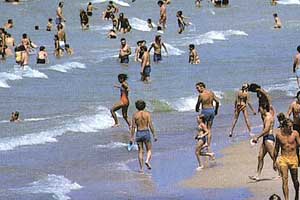Coursey puts economics of beach closings at the Dunes under microscope
By Peter SchulerNews Office
 | |
Recent research by Don Coursey, the Ameritech Professor in the Irving B. Harris Graduate School of Public Policy Studies, finds that closing beaches along Lake Michigan may make little economic or health sense. In an ongoing study, The Economic and Health Risk Trade-Offs of Swim Closures at a Lake Michigan Beach, Coursey and his colleagues collected E. coli data and visitor statistics from the Indiana Dunes State Park from 1998 to 2001.
Each week at the park’s beaches, officials take samples to monitor the water’s bacteria levels. If E. coli density exceeds the EPA standard the next morning, the beach is closed until a future sample registers as safe. According to a DNA study released in February by the Lake County Illinois Health Department and Community Health Center, seagull droppings were apparently the number one cause of E. coli bacteria in Lake Michigan last summer.
“As we gear up for another summer on the beach, aside from one’s personal aversion to bacteria, it might be beneficial to consider the effects of all those seagulls,” Coursey said. “A problem in these tests is that the levels can vary widely from hour to hour, by location and depth of water. As such, there is little correlation between the readings from one day to the next.” Coursey explained that this may lead officials to inadvertently keep a beach open when it should be closed and vice versa.
In fact, Coursey, an economist specializing in environmental policy, estimates that 14 of the 22 closures he examined were unnecessary, costing between $111,000 and $518,000. On the other hand, the swim area was left open 20 of the 28 days when E. coli exceeded regulations, costing a much more modest $1,658 to $6,661.
“We also need to be aware that there is a very low risk of contracting E. coli from swimming in a lake,” Coursey said. Of the 777 E. coli confirmed infections nationwide in 1998, only four of the illnesses and none of the deaths were attributed to swimming in a lake. Coursey estimated that across the entire summer swim season in the Indiana Dunes State Park, the closure policy would prevent only 123 cases of E. coli. Meanwhile, all swimmers visiting the beach are denied a total of 17,820 days during the summer season.
“Of course, this all changes if people suddenly place a higher value on health than past research has documented,” Coursey said, “or if they are especially averse to birds.” Coursey acknowledged that a modest increase in the value of health in the calculations in their study reverses their conclusion that leaving the beaches open regardless of E coli levels makes more economic sense.
![[Chronicle]](/images/sidebar_header_oct06.gif)